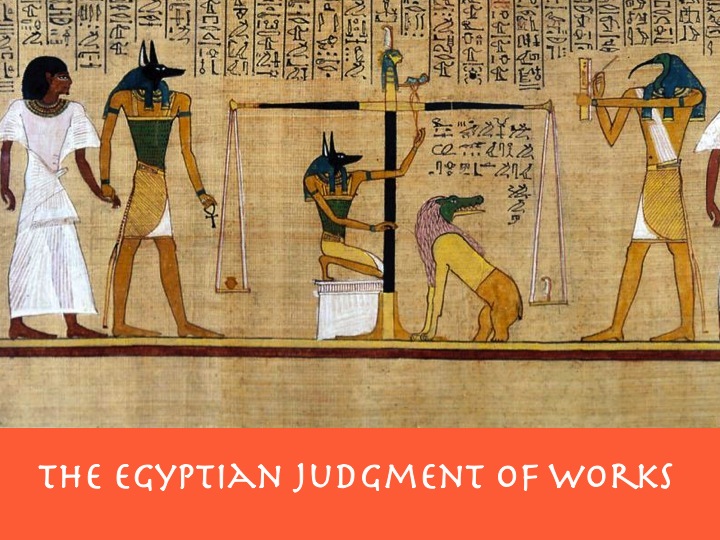Demons, Feathers, and Hearts
- Calvary
- Cross
- Death
- Eternal Life
- Forgiveness
- Gospel
- Grace
- Jesus
- Judgment
- Love
- New Testament
- Righteousness
Aug 21, 2013 3135
The judgment in ancient Egypt was a fearsome affair because it was a judgment of works. The ancient Egyptians believed that when you were born, your heart did not weigh anything at all, but every time you had an evil thought, or spoke an evil word, or did an evil deed, you heart became heavier. By appealing to the appropriate gods, one might be able to improve one’s lot, but the concept of forgiveness doesn’t seem to have featured prominently.
 The picture above is a depiction of the judgment from the Book of the Dead. On the left you can see Anubis leading the deceased to the judgment, depicted by the large set of scales. On the right you can see the god Thoth, who has faithfully recorded all the works of the person, and who is waiting to record the outcome of the judgment.
The picture above is a depiction of the judgment from the Book of the Dead. On the left you can see Anubis leading the deceased to the judgment, depicted by the large set of scales. On the right you can see the god Thoth, who has faithfully recorded all the works of the person, and who is waiting to record the outcome of the judgment.
When a person died, his or her heart was placed on one side of a balance, and on the other side was placed a feather, which you can see in this picture. If the heart weighed less than the feather, the person was allowed to enter into the eternal life of the righteous. But if the heart weighed more than the feather, then the person was given over to be tormented and consumed by Ammit, also known as “The Devourer of Souls.” You can see her in the picture, waiting to be fed. She was a demon with the body that was part crocodile, part lion, and part hippopotamus – the principal carnivores in ancient Egypt.
The ancient Egyptians had every reason to live in perpetual terror of the judgment to come. According to their beliefs, it seems to us that hardly anyone would have made it through! Sadly, many Christians today live in fear of the judgment of works as well, and this has wrongly shaped their whole view of the Christian message.
The Bible also talks about the dead being judged by their works in Revelation 20:13, but this refers only to those who have not accepted Jesus Christ as their Saviour – the judgment of the wicked. The children of God, those who are in Christ, are never judged by their works, because their judgment is based solely on the judgment of God through Christ at Calvary. Their works have already been atoned for at the cross, and by accepting that sacrifice, they have been declared righteous in Christ before God.
That’s why the apostle John tells us that “we can have confidence on the Judgment Day,” because the perfect love of God drives out fear (1 John 4:17–18). Listen again to the Gospel:
God destined us to be his adopted children through Jesus Christ because of his love. This was according to his goodwill and plan 6 and to honor his glorious grace that he has given [past tense] to us freely through the Son whom he loves. 7 We have been ransomed [past tense] through his Son’s blood, and we have forgiveness [present tense] for our failures based on his overflowing grace, 8 which he poured [past tense] over us with wisdom and understanding. (Ephesians 1:5–8, Common English Bible).
I am glad that I don’t live in Ancient Egypt. I am glad for the good news of the Gospel. I am glad that I have a Saviour. So, when I think about my future destiny, my heart, being filled with joy and hope, is as light as a feather.
//

Leave a Reply